The Fun Way To Save!, St. Trinian’s College and Kormilda College | IELTS General Reading Practice Test 10 with Answers
Table of Contents
Limited-Time Offer : Access a FREE 10-Day IELTS Study Plan!
Reading Passage 1
Questions 1-12
Questions 1-2: Read the following advertisement and answer the questions. Choose the appropriate letters A-D and write them in boxes 1-2 on your answer sheet.
The Fun Way To Save!
Join the Woolwich for Kids Club and you can save money and earn interest.
And you will have a lot of fun besides! As a club member, you will have your own passbook with a wallet to keep it in and your own special money box. Until you are thirteen we will send you the club magazine, edited by Henry’s Cat, every six months. It is full of fun and games, news, quizzes, things to do and see, and great competitions to enter. When it is your birthday, Henry’s Cat will send you a special birthday card.
If you are sixteen or under, Woolwich for Kids Club is specially for you. It’s a fun way to save!
1What is the Woolwich for Kids Club?
- a sports club
- a banking service
- a magazine
- a club for people who like cats
2How many magazines do children receive each year?
- six
- twelve
- two
- one
Questions 3-6:
Medicare – Your Health Insurer
What does Medicare cover?
Doctors
Medicare helps pay for the doctor to treat you at the doctor’s surgery or wherever you need treatment. Medicare helps pay for treatment by a specialist. If you need to see a specialist, you must be referred by your doctor.
Other medical services
- X-rays
- pathology tests
- medical tests, examinations and procedures Optometrists
Medicare helps pay for eye tests, but not for the cost of glasses or contact lenses. Dentists
Routine dental services are not covered. However, some medical-type operations performed by approved dentists are covered.
Hospitals
Public patient
If you choose to be treated under Medicare as a public patient in a public hospital. Medicare will cover all hospital costs. You pay nothing.
Private patient
If you choose to be treated as a private patient in any hospital. Medicare will help to pay for services by your doctor. However, Medicare will not pay for expenses such as theatre fees or your accommodation. These charges can be covered by arranging private health insurance.
Look at the following statements after reading the notice about Medicare. In boxes 3-6 on your answer sheet write:
TRUE if the statement is true
FALSE if the statement is false
NOT GIVEN if the information is not given in the notice
Example Answer: Medicare does not pay for glasses. –> TRUE
3 Medicare does not pay for any work done by dentists.
4 Medicare pays for ambulance fees.
5 If you have not seen a doctor first, Medicare will not pay for you to see a specialist.
6 Medicare will pay at least some hospital doctor’s costs for both private and public patients.
Questions 7-12:
You want to send some international mail.
Read the text International Postal Services on the next page and answer questions 6-11 using NO MORE THAN THREE WORDS for each answer.
Write your answers in boxes 7-12 on your answer sheet.
7 If you do not pay enough postage for airmail, how may your letter or package be sent?
8 How much does it cost to send a postcard by airmail?
9 What docs the post office use to follow the movement of priority mail?
10 Which is the best priority service if you want to send expensive jewellery abroad?
11 If you send something by either international recorded or international registered, what does the person receiving it have to do?
12 What kind of service is faster than swiftair?
International Postal Services
Getting The Price Right
It pays to get the postage right when you’re sending mail abroad. Anything intended for airmail but underpaid stands the risk of being sent by surface mail instead. So make sure that you check the postage when mailing abroad.
Stamp Books
For extra convenience, remember international stamp books. There are two available: 4 x 41p stamps with airmail labels, for sending 10 g letters anywhere outside of Europe. 4 x 35p stamps with airmail labels, for sending postcards to anywhere in the world.
Priority Treatment
Priority Services For Your International Mail
These three new services incorporate the latest barcode technology to track and trace your mail up to dispatch from the United Kingdom
-
International Recorded
Peace of mind when posting abroad
Like using recorded delivery in Britain, this service gives you a signature on delivery and is recommended for items of little or no monetary value sent worldwide. Valuable items should be sent by the international registered service.
Priced at £2.50 per item plus airmail postage, it provides compensation to a maximum of £25.
Advice of delivery (documentary confirmation of delivery) is available for an extra 40p.
-
International Registered
Greater security for your valuables
Gives you extra security in the UK and abroad, and a signature on delivery.
Available to 140 destinations, it costs £3.00 plus airmail postage for compensation up to £500; £4.00 plus airmail postage for compensation up to £1000.
Lower limits apply to some destinations; to others, registered is not available. Please check at your local post office. Advice of delivery (documentary confirmation of delivery) is available for an extra 40p.
-
Swiftair
The express airmail service
Although it is not a courier service, and therefore cannot guarantee delivery the following day, swiftair is faster than ordinary airmail, international recorded and international registered. It is the economical alternative to courier services when next- day delivery is not essential.
Price £2.70 plus airmail postage.
Also check :
Reading Passage 2
Questions 13-25
Questions 13-25: The text about Sl Trinian’s College on the following page gives the answers to questions commonly asked by the college’s applicants. There are seven sections A-G.
Choose the most suitable question-heading for each section from the list below. Write the appropriate numbers (i-x) in the correct boxes on your answer sheet.
Note: There are more question-headings than sections so you will not use all of them.
Example Answer: Section A –> vi
13 Section B
14 Section C
15 Section D
16 Section E
17 Section F
18 Section G
List of question-headings
- Which course should I apply for?
- Are the courses full-time or part-time?
iii. Are there a lot of rules?
- How much does it cost?
- What level of education do I need to enter the college?
- How can I apply?
vii. Can the college help me to get a job?
viii. When do courses start?
- What assistance is given to foreign students?
St. Trinian’s College
What applicants usually want to know—the questions we are most commonly asked.
A _________________________________________
You can either phone for an interview or complete the attached form indicating which course you would like to take and return it to us by post, enclosing the registration fee.
B _________________________________________
If you have difficulty in deciding which program would most effectively meet your needs, our academic counsellors can help you.
C _________________________________________
Our tuition fees are listed on the back of the enrollment form.
D _________________________________________
All long courses follow the academic year, but with short courses this is not possible. Full details of term dates will be mailed to you on request.
E _________________________________________
Our overseas student office will assist with immigration procedures and can also give advice on accommodation and other matters. We do everything we can to help overseas students settle in.
F _________________________________________
Most of our courses include curriculum vitae writing and interview skills. Through our extensive contacts in the local business community we are often in a position to help graduates find suitable employment.
G _________________________________________
The college is a friendly place and has a pleasant, relaxed atmosphere. The few regulations that are enforced are mainly a matter of common sense, concerned with respecting the rights of fellow students and staff. For students studying practical, job training courses, it is compulsory to wear clothing which is appropriate to their workplace.
Questions 19-25:
The following form gives information on the terms and conditions of enrollment of a college. Answer these questions in NO MORE THAN THREE WORDS.
Write your answers in boxes 19-25 on your answer sheet
19 Who does the college inform if a student does not attend classes?
20 If a student cannot speak English well, what does he or she have to agree to do first?
21 Who provides pens, pencils, books and other equipment?
22 Course fees cannot be paid in cash. How do course fees have to be paid?
23 What happens to an application fee if the course is cancelled?
24 To obtain the maximum refund, what is the shortest notice of withdrawal a student can
give?
- If a student wants to change courses and go to a different college, to whom must Ire or she apply?
Terms And Conditions Of Enrollments
Full-fee paying international students are required to:
- study on a full-time basis
- comply with the visa regulation that at least 90 per cent attendance must be maintained. The college is required to notify the immigration authorities of unsatisfactory attendance which may result in the termination of the visa
- have adequate English language proficiency for the selected mainstream course or undertake to do an ELICOS course first
- have adequate financial means to do the course
- participate in orientation activities.
Note: You are advised to read and understand the conditions set out in the government acceptance advice form when you sign the declaration because you are required to comply with those conditions as an international student in Australia.
Fees
Application fees
The non-refundable application fee is $100.
Course fees
- The course fees set for 1997/1998 are:
Certificate Courses A$ 10 200 per year
Advanced Certificate Courses A$ 10 200 per year
Associated Diploma Courses A$ 10 200 per year
ELICOS A$ 5 950 20 weeks
VCE A$ 5 600 20 weeks
- The annual course fee includes the full cost of tuition and educational services provided by the college. Textbooks, equipment, tools, stationery and any other individual requirements that you may need in your studies are your responsibility.
- Fee payment instructions are notified in the letter of provisional acceptance and fees must be paid by the date specified in the letter.
- All tuition fees must be paid by bank draft and made payable to King George’s College of TAPE.
Refund Policy
Application fees
- a) The application fee will not be refunded if the application is withdrawn after an offer of place has been made.
- b) Application fees will be refunded if the application is rejected or the course is cancelled by the college.
Course fees
If a student withdraws after payment of fees, the following will apply:
- a If notice of withdrawal is received by the college less than two (2) weeks before the course commences, no refund is given.
- b If written notice of withdrawal is given to the college less than four (4) weeks but more than two (2) weeks before the commencement of the course, 50 per cent of the course fee will be refunded.
- c If written notice of withdrawal is received by the college at least (4) weeks before the course commences. 80 percent of the tuition fee will be refunded.
All notices of withdrawal must be in writing and addressed to the Manager, International Student Programs.
The notice of withdrawal should state name, course, date of commencement and reason for withdrawal.
Transfer To Another Institution
Applications for transfer must be made in writing to International Student Programs stating reasons, and a copy of the acceptance letter from the receiving institution must be attached. Fees to be transferred will be subject to the refund policy.
Note: The college will not be responsible for any monies made payable to any agent.
Reading Passage 3
Question 26 – 40
Read the passage below and answer questions 26 – 40 that follow.
Kormilda College
Section A
Kormilda College is a unique school situated near Darwin in Australia’s Northern Territory. For 20 years, to 1989, Kormilda College operated as a government-run, live-in school for high school Aboriginal students. In 1989 it was bought from the Government by two Christian church groups and since then it has expanded enormously, to include a day school as well as boarders (residential students) in Years 8-12. Although 320 pupils of the College’s total number are Aboriginal students, drawn mainly from isolated communities across the Northern Territory, Kormilda also has a waiting list of non – Aboriginal students. With a current enrollment of 600, student numbers are expected to grow to 860 by 1999.
Section B
Central to the mission of the school is the encouragement of individual excellence, which has resulted in programs designed especially for the student population. Specialist support programs allow’ traditional Aboriginal students, who are often second language users, to understand and succeed in the mainstream curriculum. A Gifted and Talented Program, including a special Aboriginal and Torres Strait Islander Tertiary Aspirations program, has been introduced, as has an Adaptive Education Unit. Moreover, in Years 11 and 12, students may choose to follow the standard Northern Territory Courses, or those of the International Baccalaureate (I.B.).
Section C
To provide appropriate pastoral care, as well as a suitable academic structure, three distinct sub-schools have been established.
Pre-Secondary: For Aboriginal and Torres Strait Islander students in Years 8-10 who are of secondary school age but have difficulties reading and writing.
Supported Secondary: For Aboriginal and Torres Strait Islander students who are of secondary school age and operating at secondary school year levels 8-12 who need specific second language literacy and numeracy support.
Secondary: For multicultural Years 8-12 students.
Students remain in their sub-schools for classes in the main subject areas of English, Maths, Social Education and Science. This arrangement takes into account both diverse levels of literacy and the styles of learning and cultural understandings appropriate to traditional Aboriginal second-language users. In elective subjects chosen by the students – which include Indonesian, Music, Art, Drama, Science for Life, Commerce, Geography, Modem History, Woodwork, Metal Work, Economics and Legal Studies – students mix on the basis of subject interest.
Section D
To aid the development of the Aboriginal Education program, a specialist curriculum Support Unit has been set up. One of its functions is to re-package school courses so that they can be taught in ways that suit the students.
The education program offered to Aboriginal students uses an approach which begins with the students’ own experiences and gradually builds bi-cultural understanding. In one course, “Introducing Western European Culture Through Traditional Story-Telling”, students are helped to build a common base for approaching the English literature curriculum. Drawing on the oral culture of traditional Aboriginal communities, they are introduced to traditional stories of other cultures, both oral and written. In a foundational Year 10 course, “Theory of Learning”, concepts from Aboriginal culture are placed side by side with European concepts so that students can use their own knowledge base to help bridge the cultural divide.
Another project of the Support Unit has been the publication of several books, the most popular, Korniihla Capers. The idea for Kormilda Capers came about when it became obvious that there was a lack of engaging material for the school’s teenage readers. One of the stories in the book, “The Bulman Mob hits the Big Smoke”, recounts the adventures of Kormilda pupils on their first visit to Sydney, Canberra and the snow country. Focussing on experiences which have directly affected the lives of students at the College, and on ideas and issues which are of immediate interest to Aboriginal students, Kormilda Capers has earned enthusiastic support within and outside the school.
Questions 26 – 27
Kormilda College opened as a school in 26_________________
At the time of writing there were 27_________________ non-Aboriginal students at Kormilda College.
Question 28
From the list below, choose the best heading for Section B of the reading passage. Write the appropriate letter A-D in box 28 on your answer sheet.
A Specialist teaching and teachers at Kormilda College
B Special Programmes at Kormilda College for Aboriginal students
C The new look Kormilda College
D Programmes at Kormilda College to promote individual excellence
Questions 29 – 33
The following diagram shows how Kormilda College is organised. Complete the diagram using information from the text. Use NO MORE THAN THREE WORDS for each answer. Write your answers in boxes 29-33 on your answer sheet.
Kormilda College
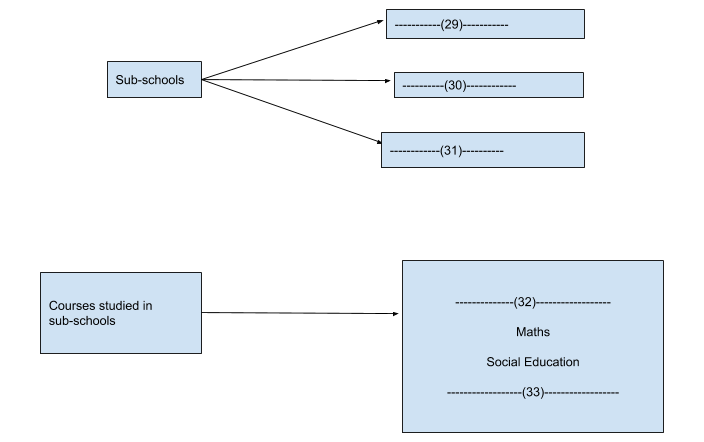
Questions 34 – 40
Read the passage about Kormilda College and look at the statements below. In boxes 34 – 40 on pour answer sheet write:
TRUE if the statement is true
FALSE if the statement is not true
NOT GIVEN if the information is not given in the passage
34 Kormilda College educates both Aboriginal and non-Aboriginal students.
35 Some students travel from Arnhem Land to attend Kormilda College.
36 Students must study both the International Baccalaureate and Northern Territory courses.
37 The Pre-Secondary School attracts the best teachers.
38 The specialist curriculum Support Unit adapts school courses so the students can approach them more easily.
39 There are no oral traditional stories in Western communities.
40 The school helps the students make connections between Aboriginal and non-Aboriginal cultures.
Answer Key
Unlock Answers
Reading Passage 1
| 1 | B |
| 2 | C |
| 3 | FALSE |
| 4 | NOT GIVEN |
| 5 | TRUE |
| 6 | TRUE |
| 7 | by surface mail |
| 8 | 35 p |
| 9 | barcode technology |
| 10 | international registered |
| 11 | sign on delivery |
| 12 | courier service |
Reading Passage 2
| 13 | i |
| 14 | iv |
| 15 | viii |
| 16 | ix |
| 17 | vii |
| 18 | iii |
| 19 | immigration authorities |
| 20 | an ELICOS course |
| 21 | the students |
| 22 | by bank draft |
| 23 | it is refunded |
| 24 | over 4 weeks |
| 25 | International Student Programs |
Reading Passage 3
| 26 | 1989 |
| 27 | 280 |
| 28 | D |
| 29 | pre-secondary |
| 30 | supported secondary |
| 31 | secondary |
| 32 | English |
| 33 | science |
| 34 | T |
| 35 | NG |
| 36 | F |
| 37 | NG |
| 38 | T |
| 39 | NG |
| 40 | T |
Start Preparing for IELTS: Get Your 10-Day Study Plan Today!
General Reading Practice Tests
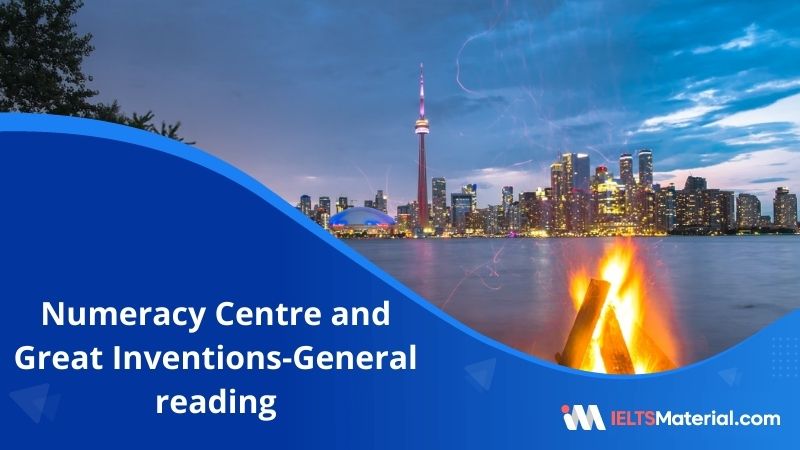
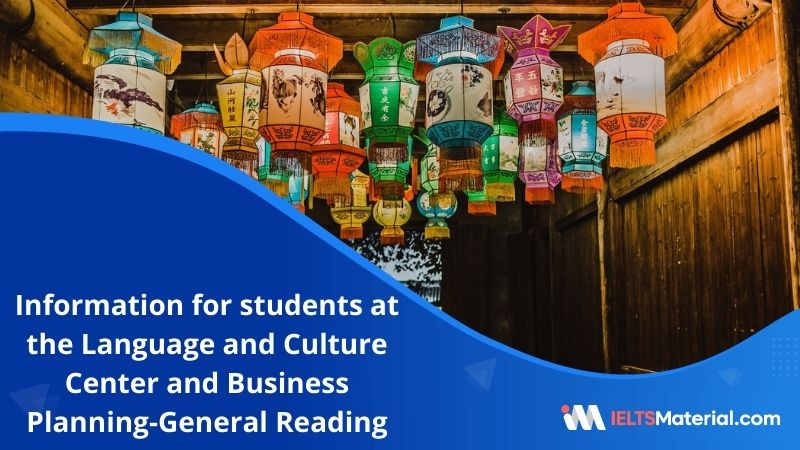
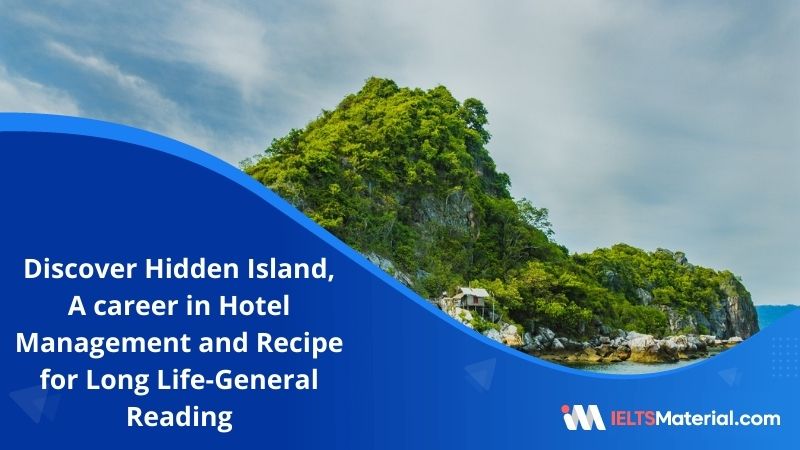
Recent Articles

Kasturika Samanta

Janice Thompson

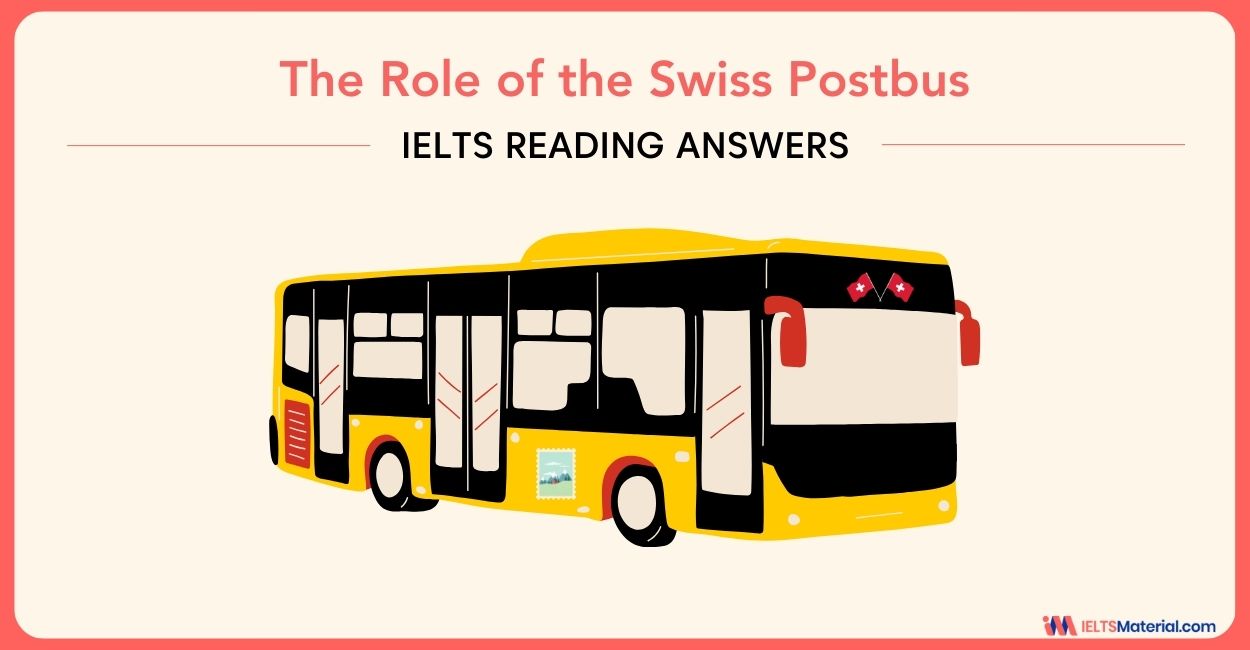
Kasturika Samanta
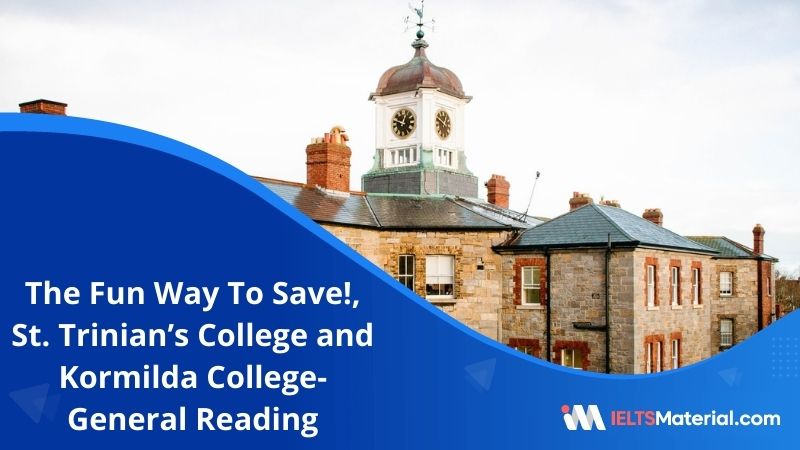
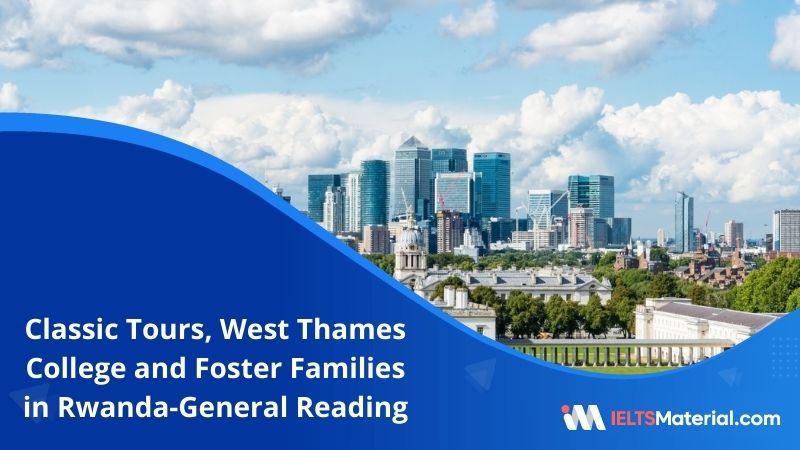


Post your Comments